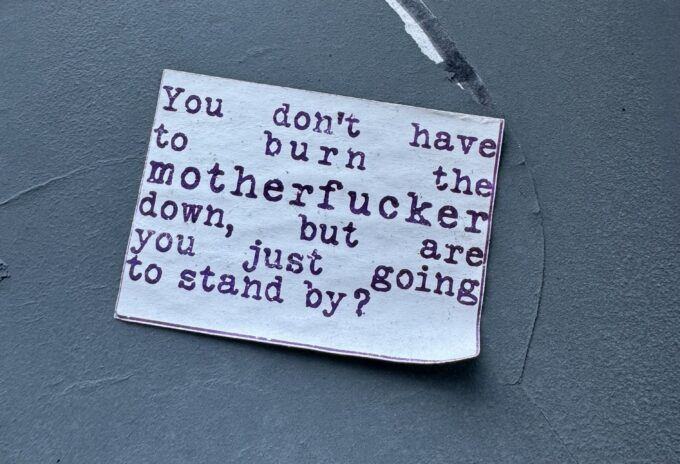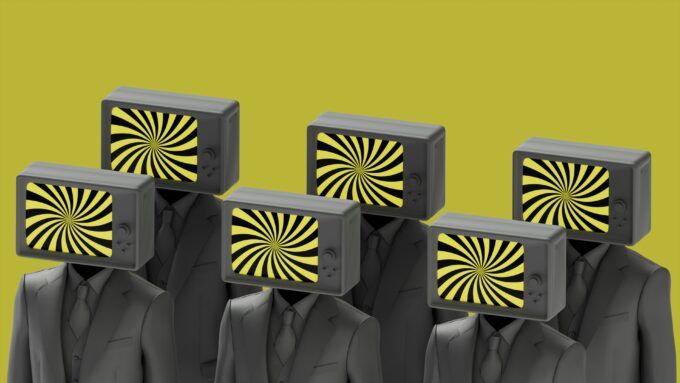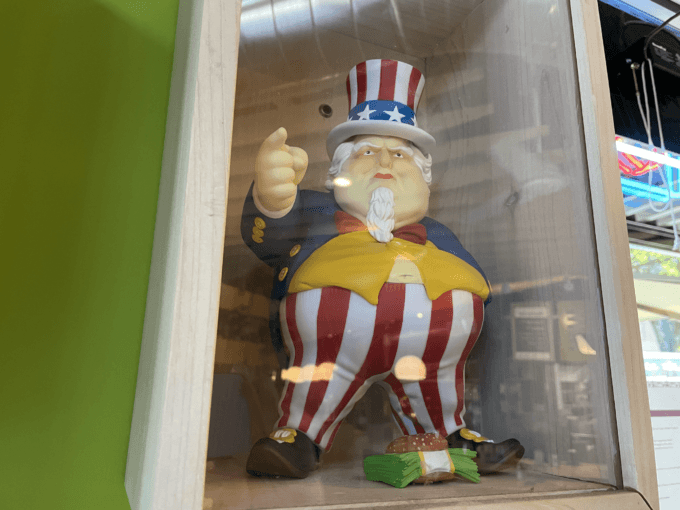
BrexTrump
Published on http://www.counterpunch.org/
Brexit and Donald Trump have been explosive in the sense of a sudden, unexpected, cataclysmic appearance as fact. Whether they go on to explosive as disaster, we may soon see. But how much of both events are unexpected in ways that we are not historically prepared to see? Or, more apt, have no precedents, there being no paper trail leading to them? You can trace the British exit from the EU back to the Magna Carta. A sense of England’s special place, “England’s green and pleasant land” was lauded in William Blake’s lines:
And did those feet in ancient time
Walk upon England’s mountains green?
And was the holy Lamb of God
On England’s pleasant pastures seen? (“Jerusalem”, 1810)
Trump, on the other hand, has no such deep historical roots nor is his endurance enabled by anything we have ever seen before. I will need to qualify this statement but not the assertion that a new cultural landscape has brought him to life and continues to sustain him. We cannot be reasonable about the Trump explosion if we continue to believe, as many do, that we have seen this before, that everything about this election is same old same old, just accelerated by Smartphones, Twitter and Facebook.
We have actually fallen into long term memory loss that allows us to think that thinking has not degenerated but rather has expanded through a hi-tech, cyberspace mediation. We can think and do multiple things at once. We can speak our questions into our phones and get immediate answers. We each walk around with a Delphic Oracle in our hands. We pity the Smartphone-less past, elections before social media. We pity and mock the analog slog of time.
The philosopher Susan K. Langer reminds us “If we would have new knowledge, we must get us a whole world of new questions” and that answers are interpretations, not facts, and that such interpretations are built upon an edifice of understanding, slowly woven over a lifetime. The growth of such understanding rests upon what questions to ask, like an artist choosing a color, or a batter choosing a pitch. Selecting what questions to ask amid the vast messaging of the capitalist market is no easy task. It requires an already resident level of understanding, which is in turn expanded by asking questions, which do not fragment us or lead to the servitude of our understanding.
This is a version of “To make money, you need to have money,” which seems more apt than ever considering that our financialized sector has replaced manufacturing as the biggest profit center in the economy. Our understanding “start-up” relies upon societal institutions, most especially education. Unfortunately, the young are now almost immediately propelled into a world of infinite personal choices that establish an illusionary premature empowerment. It is difficult thereafter to lead someone beyond their first impressions, likes and dislikes, opinions and prejudices, which is the task of education.
I do not see how any instrumentation that speeds up the questions and answer machinery, like an automatic pitching machine kicked to throw faster, does anything more than give one the illusion that they must be getting smarter. At this moment, we expect that 7 year olds who can hack into your computer and download Angry Birds will one day far surpass any analog hero.
I expect that if the same conditions that now have led us to Donald Trump augment in the future then we can expect either there will be no future (Trump as president having led to that disastrous explosion) or every future avatar of Facebook will elect its own president. In the former case, what we have is a kind of societal understanding that has evaporated and a personal understanding that has deteriorated to a Twitter level. In the case of a fragmented socius conducted on-line, we have nothing less than a dystopia we seem not able to either imagine or reason against.
You can find Trump’s roots in all the coded vitriol and prejudice that Neoliberals have employed since Reagan. You can also find populist heroes from Andrew Jackson and William Jennings Bryan to Joe McCarthy, Pat Buchanan, George Wallace, Huey Long, Ross Perot, and Sarah Palin. You could say that Trump robs a bit from each and has aroused more antagonism than the socialist candidacy of Bernie Sanders. While Neoliberals can dismiss any call “to do something for the poor” as a standard Liberal line, Trump’s words are deeply enraging to Republicans whose party he represents for the presidency. Such rage is not new in U.S. history.
“Old Hickory” Andrew Jackson stood for the “Common Man” but his inauguration brought fear into the hearts of the elite:
“Jackson’s inauguration in 1828 seemed to many the embodiment of “MOB RULE” by uneducated ruffians. Jackson rode to the White House followed by a swarm of well-wishers who were invited in. Muddy hob-nailed boots trod over new carpets, glassware and crockery were smashed, and chaos generally reigned. After a time, Jackson ordered the punch bowls moved outside to the White House lawn, and the crowd followed. Naturally, Jackson’s critics were quick to point to the party as the beginning of the “reign of King Mob.” (U.S.history.org)
“Every Man a King” Huey Long stood for a radical re-distribution of the wealth, a message that brought his enemies to the gate.
“By 1935, Long’s most recent consolidation of personal power led to talk of armed opposition from his enemies. Opponents increasingly invoked the memory of the Battle of Liberty Place of 1874, in which the white supremacist White League staged an uprising against Louisiana’s Reconstruction-era government. In January 1935, an anti-Long paramilitary organization called the Square Deal Association was formed. Its members included former governors John M. Parker and Ruffin G. Pleasant and New Orleans Mayor T. Semmes Walmsley. On January 25, 200 armed Square Dealers took over the courthouse of East Baton Rouge Parish. Long had Governor Allen call out the National, declare martial law, ban public gatherings of two or more persons, and forbid the publication of criticism of state officials. The Square Dealers left the courthouse, but there was a brief armed skirmish at the Baton Rouge Airport. Tear gas and live ammunition were fired; one person was wounded but there were no fatalities. (Wikipedia)
Trump ignites once again the fear of “Mob Rule,” a fear first expressed quite clearly by Jefferson: “A democracy is nothing more than mob rule, where fifty-one percent of the people may take away the rights of the other forty-nine.” But the questions arise as to who are in fear and to whom is Trump explosive?
Trump is not advocating a Bernie Sanders-like re-distribution of the wealth but he does dissent from the anti-entitlement views of Neoliberals. A government so small you can drown it in a bathtub is not a signature Trump goal. And it is difficult to see how the Republican Party, which has reached the Populist Mob by tickling their racist, bigoted and xenophobic inclines, can object to Trump openly making such appeals.
Reagan’s “Welfare Queens” and Bush `41’s “Willie Horton” were aimed at stirring up “The Mob” to gain votes for those who would make use of what they feared. George Romney in his 2012 presidential campaign judged, to his regret, that the time was right to attack the Mob populace as “Moochers.” Trump, on the other hand, timed his open declarations of racism, xenophobia, misogyny perfectly. It was already clear before the 2008 Great Recession that whatever form of capitalism was being played, it had not done some 80% of the population any good and was on the road to making things even worse.
In short, the Mob was ready to explode. All that was needed was a leader who stayed visceral, who derided the Elite/Donor class, who promised to fulfill an American Dream scenario that, in truth, was already beyond recuperation.
Hillary cannot explode the status quo the way Trump promises to do. Bernie, however, had the closest thing to an explosive device in hand but what amounts to a Marxist critique of capitalism does not reach the Masses the way a direct, visceral attack can. If you want to play to the emotions, reflection put out of the way, you need to proceed like a Reality TV show, something like The Apprentice. You need to go for a gut response.
Which takes us to another foreshadowing of Trump’s emergence, namely, George Dubya Bush, the Regular Guy, the guy with whom you would like to have a beer. Unfortunately, he turned out to be the guy who sent a lot of people to an early grave in places we should never have been. Either his disinterest in understanding anything, a special brand of ignorance and stupidity, made him the easy foil of a clever set of twisted minds, or it led him without coaxing into that debacle will be a subject repeatedly reviewed or buried in the rush of our Twitter discourse.
The Trump connection here is that the Mob had already sought to be ruled by an incompetent, by a man clearly uninformed and without a desire to be informed, by a wounded man, wounded in the way only the scions of wealth and prestige can be wounded. Dubya, like Trump, has as much affiliation with the bottom 80% of the population as Queen Elizabeth has with her subjects. And if we look back further to Ronald Reagan and his appeal to Democrats, working class Democrats, we see yet another mindless attachment made by the Mob to a man who promised a “new morning in America” and handed middle class nest eggs over to the top 20%.
You cannot degrade awareness, replacing it with fragmented focus, think your opinion is somehow an interpretation, or collapse understanding into a GPS mapping of facts at hand without at some point giving birth to a Donald Trump. We can see now that truly the most explosive reality is an erosion of mentality, an explosion of an intelligent public discourse into shrapnel, a tower of Babel platform wherein the uninformed yet unteachable clash with the equally uninformed and unreachable.
We can see now that a degeneration of political understanding, incapacity to stay focused on the issues at hand and thereby separate the distractions from the dire, the “whatever” from the essential have in concert led us to Trump.
There are many who are thrilled by the proliferation of platforms, streams, apps, websites, blogs, photos, videos, or, as Tumblr puts it: “Stories, photos, GIFs, TV shows, links, quips, dumb jokes, smart jokes, Spotify tracks, mp3s, videos, fashion, art, deep stuff. Tumblr is 303 million different blogs, filled with literally whatever.” There is an enchantment here, one that most definitely, if the owners of the robots and AI have their way, will intensify. This is also the space where mania and megalomaniacs breed. This is also a space that explodes and implodes the defenses and aptitudes sought and sometimes achieved by a sense of civilization as an advance of society and culture.
Donald Trump is a new phenomenon in the sense that he thrives in a political and social arena that we have never seen before, that is not fully birthed, that is a “rough beast, its hour come round at last.” And he is a magister ludi here in this domain of tweets and emojis. Donald Trump is also an old rebirth of the fear of Mob Rule, of the low cards of hatred and bigotry being played, of the collapsed state of our ability to interpret and understand what is in front of us.














13 Comments
Anthony Bernardo
You can go back even further, to George Wallace, or even earlier. The scary part is that the mob moved from being localized to nationalized over the last 60 years giving rise to fearful mob exploitation by the nominee of a major party. Kind of like a slowly spreading pandemic that started in one house in one town. My explanation of the increase in the mob, which will no doubt awaken the wrath of at least one of your readers, is that free market capitalism is a great system for a time, as was mercantilism as claimed by their advocates, or divine royalty as claimed by their advocates. I’ve always been a free marketer, but not unregulated free markets nor markets that leave too many behind, which is what we are now experiencing. Unregulated free market capitalism, without an adequate social safety net, nor an adequate understanding by the mob of basic supply demand economics or history is what’s giving rise to the spreading mob, and the nomination of a Trump by a major American party. The country has failed miserably to prepare the population with the tools to thrive in a rapidly changing world, spending way too much time on creationism debates or intruding into a woman’s life, as examples, rather than preparing for what globalization would mean for our working people of all collars. After WW2 the government provided for the education of our vets and they created the next 50 years of growth; now we do nothing publically to prepare the next generation. Norquist’s bathtub doesn’t help matters either, but exacerbates the situation instead. At the same time, our advertising convinces that everyone must, absolutely must, own the newest gadget, own their own home, three TVs minimum, and a general consumer driven American dream now reserved for only those that have the skills to compete in a global economic system or global and technology proof occupations. (The Ford Rouge plant that once had no robots and about 60,000 employees, now has many, many robots and about 6,000 employees – technology is also working against the good manufacturing jobs we used to have and they “ain’t” coming back under any circumstances, NAFTA or no NAFTA; China or no China). Unfortunately, neither HRC or DT is likely going to provide an answer, and certainly not DT.
Anthony Bernardo
You don’t pay for your medical exam either. In part I do. Insurance is the purest form of socialism in this country. It’s pure redistribution. If we had to pay it all ourselves, we’d all be dead.
Anthony Bernardo
Delusion is a wonderful form of rationalism. Redistribution of funds is socialism regardless of who does the redistribution.
Anthony Bernardo
Your examples are a stretch at best. Capitalism is supposed to be primarily win win not zero sum. Of course on a micro level it’s win lose but macro it has to be win win or major conflict will arise as history has shown.
Anthony Bernardo
Almost forgot. I pay my insurance policy to protect me not you. Your use of my funds is a consequence not an intent.
Anthony Bernardo
My point is that my insurance premiums pay your bills and visa versa depending. Of course I pay the insurance company freely, but not to pay for your illness; to pay for mine. If my funds are given to you instead well then I don’t agree but the insurance imposes that condition. Socialism. And almost forgot just means that, but I remembered.
Anthony Bernardo
Sorry, but you’re using my money redistributed through the insurance company. That’s socialism. I obviously don’t have a problem with that. But I’d suggest you stand in front of a mirror and repeat three times – I support socialist organizations like insurance. If you don’t collapse, lose your voice, or drop dead, it will show you it’s all OK.
Anthony Bernardo
Richard, you’re beyond hope. But if you are happy, it’s all OK.
Anthony Bernardo
An insurance company sells auto insurance to 10 guys. Each pays 100$/mo. Nine of them has no incident, but one has a $12000 payment for an accident. His $100 bought him $10,800 of the other people’s money that they paid for their own protection. The $10,800 was redistributed from their accounts to pay for one guys accident.
Anthony Bernardo
They didn’t want that and asked for their money back. But the insurance company said that was the deal. Their money went to payoff somebody else’s problem. The government collects taxes from 100 million people. They redistribute it to services for 320million people. The 100 million don’t like that their tax money was redistributed from their accounts to pay for the other 220 million. The 100 million don’t like that. They want to reduce taxes and only have the government use the money for themselves. The call the redistribution socialism. They made the other 200 million have a higher net worth. Except, the 100 million,or a few of them call it socialism. they all got what they paid for.
Anthony Bernardo
I see no difference. One takes your money in return for protection and distributes it to others that need it more. The other takes your money in return for protection and distributes it to others that need it more. Both offer protection. Both redistribute. Both provide services. Both give you a choice to participate or not participate. ( In the case of the government, you have a choice to move to less expensive places like Syria, Lebanon, or Guatemala, or where ever; you’ll get nothing, but you pay nothing of course.) What’s that old line, “nothing ain’t worth nothing but it’s free”.
Anthony Bernardo
Enough.
Anthony Bernardo
You don’t understand Richard. Enough means the conversation is over.